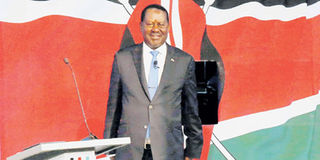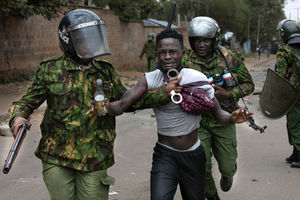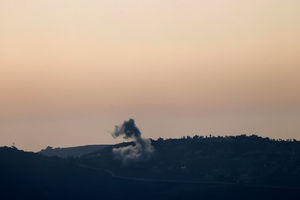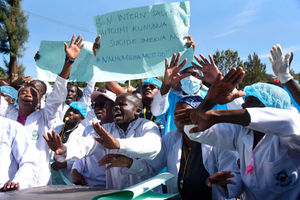Is this the end of the road for veteran politician?

Nasa presidential candidate poses after a televised debate in Nairobi last month. The veteran politician is expected to announce his future plans in Kenyan politics soon. PHOTOIFILE
What you need to know:
- He was attending a conference on political reforms in Africa held at the University of Dar es Salaam’s Faculty of Engineering - now the College of Engineering and Technology (CoET).
Arusha. In September 1997 Raila Odinga, happened to be in Dar es Salaam.
He was attending a conference on political reforms in Africa held at the University of Dar es Salaam’s Faculty of Engineering - now the College of Engineering and Technology (CoET).
The meeting attracted political activists - mainly from the political parties and the academia - and apparently took stock of the reforms undertaken with the re-introduction of multi-party politics.
I happened to be there and after noticing his presence I found out the man was a material for an interview given his status and the fact that Kenya was heading for elections in three months’ time.
At that time the local papers in Tanzania were still awash with successive deaths of prominent people in the world which happened almost at the same time.
These included the tragic death of the famous Princess Diana in a horrific car crash in Paris and Mother Theresa, a Catholic nun from Calcutta, India who touched the hearts of millions across the world.
There was also the demise of Mobutu Sese Seko, the master of his fallen empire of graft in former Zaire, a few months after he was defeated and dethroned by forces led by the late Laurent Kabila.
Would Raila make a big story? One would guess. He was the leader of the National Development Party (NDP) and he was going to contest the Kenyan presidency for the first time.
His father Jaramogi Oginga Odinga had died three years earlier - in January 1994 after having led the opposition from the 1960s but failing to win the presidency.
At the brief interview during the tea break, Raila, 72, appeared optimistic on his long struggles and enthusiasm the region was witnessing because of the political reforms.
But on that year’s elections in Kenya, he was not amused. Only a month before the Dar es Salaam meeting, the Coast region (around Mombasa) had witnessed some killings which were later associated with the polls.
Nonetheless, he was emphatic on one thing; the ruling party or those at the helm of power in his Kenya then would do everything to ensure Kanu was not defeated in the December 1997 polls as was the case in December 1992.
One of the schemes he feared the rulers would use was disenfranchisement of people from voting. He was critical of the registration of voters in his country for that year’s elections.
“There are schemes already employed to ensure some people are denied their right to vote”, he said, adding that this could have been done through manipulation of the registration process, terror campaigns to certain communities and the like.
Raila went back to Kenya and was one of the presidential candidates for the top seat. Kanu once again retained power but for the last time as it was swept out of the throne in the December 2002 polls.
The son of the first Kenyan vice president the late Odinga is never tired of political activism. He is known to be campaigning even when elections are many years to come or have just ended.
At one time, he joined forces with former President Daniel arap Moi to beef up the disintegrating Kanu against a wave of the opposition parties clamouring for power. The project failed. Raila and other “young turks” left Kanu after President Moi had hand-picked Uhuru Kenyatta as Kanu’s presidential candidate.
Back to the opposition Raila merged his NDP into one huge opposition outfit called Narc which was to send Kanu and Mzee Moi reeling out of power. And Kenyatta, who won on last Tuesday’s presidential election became a member of opposition.
One of Raila key partners in unseating the independence party from power was Kenya’s third president Mwai Kibaki. But their alliance did not last long after a fallout that followed a stalled constitutional process.
Kibaki and Raila would meet in the 2007 elections in one of the most competitive Kenyan elections in the history of the country.
Many observers contend that the never-say-die opposition leader was much closer to winning presidency in 2007 than at any other time, including this year.
In fact, live TV screens showed him ahead of Mr Kibaki by about a million votes in the second day of the vote counting, only for the mathematics to make a U-turn in favour of Kibaki on the third day!
Kenya then plunged into bloodshed which cost the lives of 1,300 people and displacement of about 600,000 during two months of politically-instigated violence.
With Raila, once again failing in his dream of the State House seat, what does the future hold for him?
A section of the Kenyan media reported on Monday that the 72 years old has vowed not to run again. This despite the fact that he has he has remained in touch with his base sending messages of defiance and unsuccessfully calling for mass protests on Monday.
Observers further say Raila’s promise not to contest again should not be taken as retirement from politics and political activism.
The career politician who made a name for himself after he was jailed during the struggles for democracy in Kenya in the early 1980s, might find it difficult to throw in the towel.




